review of unit 5 If you go to the party, you have a great time!
- 格式:ppt
- 大小:142.50 KB
- 文档页数:10
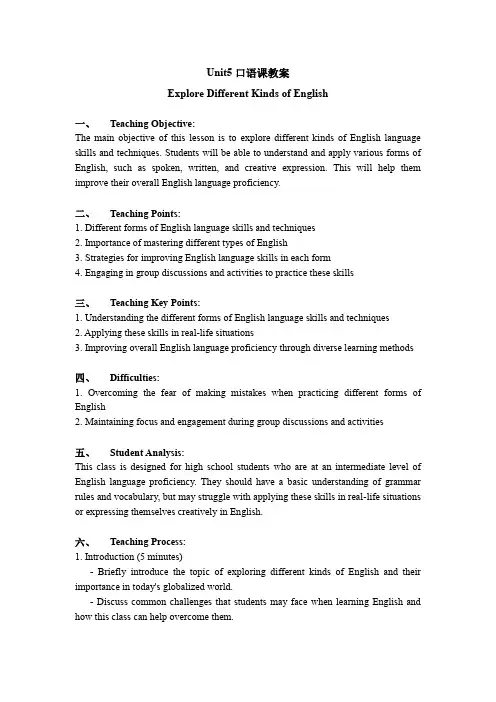
Unit5口语课教案Explore Different Kinds of English一、Teaching Objective:The main objective of this lesson is to explore different kinds of English language skills and techniques. Students will be able to understand and apply various forms of English, such as spoken, written, and creative expression. This will help them improve their overall English language proficiency.二、Teaching Points:1. Different forms of English language skills and techniques2. Importance of mastering different types of English3. Strategies for improving English language skills in each form4. Engaging in group discussions and activities to practice these skills三、Teaching Key Points:1. Understanding the different forms of English language skills and techniques2. Applying these skills in real-life situations3. Improving overall English language proficiency through diverse learning methods四、Difficulties:1. Overcoming the fear of making mistakes when practicing different forms of English2. Maintaining focus and engagement during group discussions and activities五、Student Analysis:This class is designed for high school students who are at an intermediate level of English language proficiency. They should have a basic understanding of grammar rules and vocabulary, but may struggle with applying these skills in real-life situations or expressing themselves creatively in English.六、Teaching Process:1. Introduction (5 minutes)-Briefly introduce the topic of exploring different kinds of English and their importance in today's globalized world.- Discuss common challenges that students may face when learning English and how this class can help overcome them.2. Formative Assessment (10 minutes)-Have students work in pairs to discuss their favorite ways to practice English (e.g., reading, writing, listening, speaking) and why they enjoy these activities.-Encourage students to share examples of how they have used English in their daily lives.3. Learning Objectives (15 minutes)-Introduce the different forms of English language skills and techniques (e.g., spoken, written, creative expression).-Discuss the benefits of mastering each form and how it can improve overall English language proficiency.- Provide examples of each form and discuss strategies for improving each skill.4. Application (20 minutes)-Break students into small groups and assign each group a specific form of English language skill or technique to explore (e.g., poetry writing, storytelling, debate).- Have students engage in group discussions and activities related to their assigned skill, using a variety of resources (e.g., books, articles, videos).- Encourage students to share their findings with the class and provide feedback on each other's work.5. Closing (5 minutes)- Review the key points covered in the lesson and emphasize the importance of practicing different forms of English in order to improve overall proficiency.- Ask students to reflect on what they learned in this lesson and what they plan to do differently moving forward to improve their English language skills.七、Homework:1. Write a reflection paper on the different forms of English language skills and techniques covered in the lesson. Discuss how you can apply these skills in your own life to improve your overall English language proficiency.2. Practice a new form of English language skill or technique outside of school by setting aside time each day to engage in the activity (e.g., reading a book in English, watching a movie without subtitles, joining an online forum to practice writing).3. Share your progress with your teacher or classmates by presenting your reflection paper or sharing your experiences practicing a new form of English language skill or technique.。
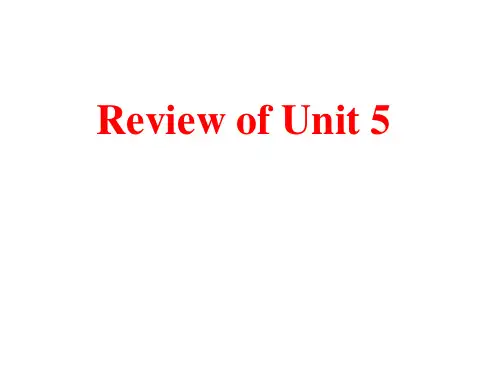
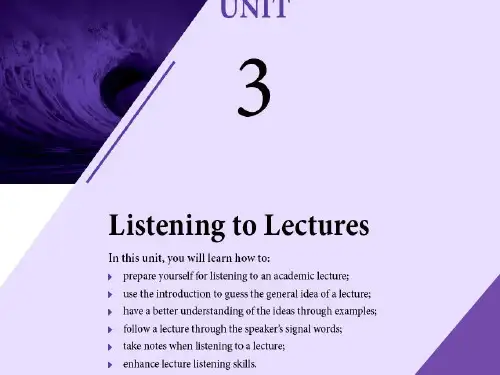
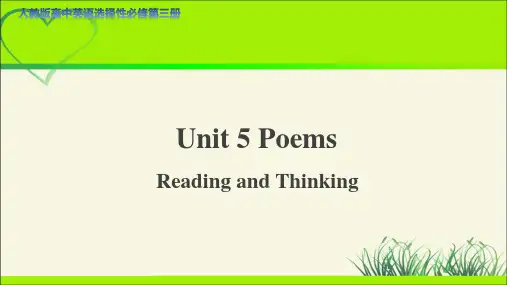
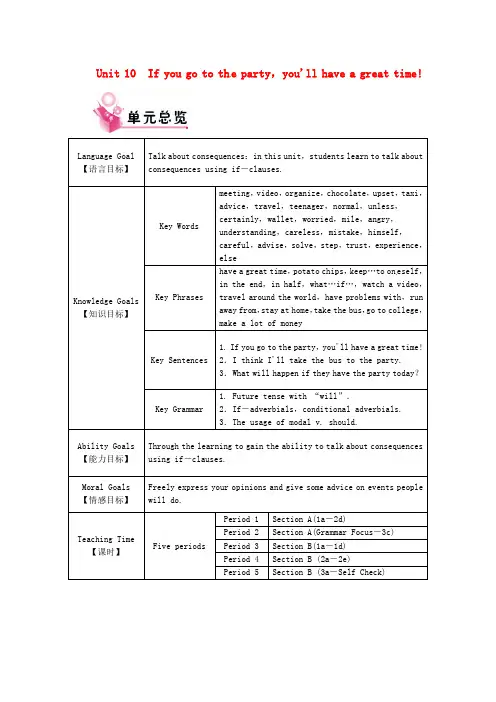
Unit 10 If you go to the party,you'll have a greattime!本单元以“If you go to the party,you'll have a great time!”为话题,通过“Talk about consequences”来学习if引导的条件状语从句,掌握用be going to 表示将来的时态,正确使用情态动词should。
从学生熟悉的party出发到对未来职业选择的探讨,鼓励学生作出自己的决定,并对这一决定所带来的结果进行讨论和评判。
该话题贴近学生生活,鼓励学生对未来的生活展开丰富的想象。
其中,对于生活中重要内容的探讨和为慈善活动寻找新点子设计海报等不失为德育教育的好素材。
第一课时Section A(1a-2d)Teaching Goals【教学目标】Key words & phrases:meeting,video,organize,chocolate,go to the party,have a great time,stay at home,take the bus,watch a video,potato chipsKey sentences:1. If you go to the p arty,you'll have a great time.2. I think I'll go to the party with Karen and Anna.3. If we ask people to bring food,they'll just bring potato chips and chocolate because they'll be too lazy to cook.Teaching Key Points【教学重点】The vocabulary:meeting,organize,have a great timeTarget language:—I think I'll go with Karen and Anna.—If you do,you'll have a great time. If we have it today,half the class won't come.If we ask people to bring food,they'll just bring potato chips and chocolate because they'll be too lazy to cook.Teaching Difficult Points【教学难点】1. Future tense with “will”.2. If-adverbials,conditional adverbials.Teaching Aids【教学工具】An English textbook,a tape recorder,CAI or courseware.Teaching Steps【教学过程】★Step 1Leading in1.Greet to the class and check the homework.2.Sing a song “If you are happy” together.3.Show a picture of a robot. Ask the students “If you have a robot,what will you do?” Write down students' answers.★Step 2Pre-taskPage 73,1a.1.Call attention to the chart in 1a. Ss read the four statements in the left column.2.Match the statements with the pictures a—d.3.Ask a student to give his or her answers.4.Check the answers.Page 73,1b.1.Turn to 1b. Call attention to Responses column.2.Listen to the recording. Complete the responses in 1a.3.Ask Ss to give their answers.4.Check the answers.★Step 3While-taskPage 73,1c.1.Point to the example in the box.2.Pair-work:Ask Ss t o do a practice with partners.3.Ask some pairs to act.Page 74,2a & 2b.1.Read the instructions. Make sure the students know what to do.2.Play the recording. Ss listen and write down their answers.3.Correct the answers.★Step 4Post-taskPage 74,2c.1.Ask two students to read the sample dialogue.2.In pairs,get the students to role-play the conversation between Nelly and Mark.3.Ask a few pairs of students to practice their conversations for the class.Page 74,2d.1.Ss read the conversation in 2d.2.Lead Ss to practice reading the conversation. Meanwhile,explain the following pattern sentences to the class:(1)For the party next week,should we ask people to bring food?(2)If we ask people to bring food,they'll just bring potato chips and cho colate because they'll just bring potato chips and chocolate because they'll too lazy to cook.(3)If we do that,more people will want to play the games.3.Pair-work. Ss work in pairs to role-play the conversation. In this part,student A will be Jeff. Student B will be Ben. As they talk,move around to monitor their work. Offer language or pronunciation support as needed.4.Ask some pairs to present the conversation to the class.★Step 5Homework1.Practice reading the conversation in 2d.2.Do the exercises on Page 67 in students' book.Board Design板书设计Unit 10If you go to the party,you'll have agreat time!The first period Section A(1a-2d)1.Key vocabulary:meeting,video,organize,chocolate,have a great time,watch a video,potato chips2.Target language:①A:I think I'll go to the party with Karen and Anna.B:If you go to the party,you'll have a great time.②A:Are you going to the party tomorrow night?B:Yes,I am.A:Who will you go with?B:I think I'll go with Karen and Anna.A:If you do,you'll have a great time.第二课时Section A(GF-3c)Teaching Goals【教学目标】Key words & phrases:upset,taxi,advice,give sb. some advice,get up late,make some friends,get enough exerciseKey sentences:1.—I think I'll take the bus to the party.—If you do,y ou'll be late.2.—What will happen if they have the party today?—If they have it today,half the class won't come.3.—Should we ask people to bring food?—If we ask people to bring food,they'll just bring potato chips and chocolate.Teaching Key Points【教学重点】The vocabulary:upset,advice,give sb. some adviceTarget language:I think I'll stay at home. If you do,you'll be sorry. What will happen if they have the party today?If they have it today,half the class won't come. Should we ask people to bring food?If we ask people to bring food,they'll just bring potato chips and chocolate.Teaching Difficult Points【教学难点】1. Future tense with “will”.2.If-adverbials,conditional adverbials.Teaching Aids【教学工具】An English textbook,CAI or courseware.Teaching Steps【教学过程】★Step 1Leading in1.Check the homework by asking 2 or 3 Ss to read the conversation in 2d on Page 74.If the students fluently read it out and have an accurate pronunciation,praise them.2.Ask some students to make sentences with “if”.★Step 2Pre-taskPage 75,Grammar Focus.1.Review the grammar focus. Ask Ss to say the statements and responses.2.Ask Ss to work in small groups. Ask each group to write down as many sentences like those in the grammar focus as they can.3.Ask some groups to share their sentences with the class.★Step 3While-taskPage 75,3a.1.Call attention to 3a.Read the instructions to the class.2.Ask Ss to read the letter for the main idea quickly.3.Ss complete the task in 3a on their own. Fill in the blanks with the correct forms of the verbs in brackets.4.Check the answers.Page 75,3b.1.Turn to 3b.Read the instructions to the class.2.Ss scan the contents before the blank lines. Then complete the sentences on their own.3.Ask 2 or 3 Ss to present their answers.4.Correct the mistakes if there are some in their answers.★Step 4Post-taskPage 75,3c.1.Call attention to 3c.2.Read the instructions and then have a student read the example. Make sure everyone knows what to do.3.Ask the whole class to practice doing the exercise together.4.Group-work. Ask Ss to work in groups of five or six. Then let several groups to say their stories to the class.★Step 5Homework1.Have Ss write their sentences with “if” on their exercise books.2.Do the exercises on Page 68 in students' book.Board Design板书设计Unit 10If you go to the party,you'll have agreat time!The second period Section A(GF-3c)1.Key vocabulary:upset,taxi,give sb. some advice,get up late,make some friends,get enough exercise2.Target language:①A:I think I'll stay at home.B:If you do,you'll be sorry.②A:What will happen if they have the party today?B:If they have it today,half the class won't come.③A:Should we ask people to bring food?B:If we ask people to bring food,they'll just bring potato chips and chocolate.第三课时Section B(1a-1d)Teaching Goals【教学目标】Key words & phrases:travel,agent,go to college,get an education,travel around the world,make a lot of moneyKey sentences:1.If you join the Lions,you'll become a great soccer player.2.What do you think I should do?Can you give me some advice?Teaching Key Points【教学重点】The vocabulary:travel,go to college,give sb. some advice,make a lot of money,travel around the worldTarget language:What do you think I should do?Can you give me some advice?I think you should go to college. But if I go to college,I'll never become a great soccer player.Teaching Difficult Points【教学难点】1.Future tense with “will”.2.If-adverbials,conditional adverbials.Teaching Aids【教学工具】An English textbook,a tape recorder,CAI or courseware.Teaching Steps【教学过程】★Step 1Leading in1.Greetings.2.Check the homework.★Step 2Pre-taskPage 76,1a.1.Ask Ss to complete the work on their own.2.Then do a quick check to see which things are the most important to Ss in theclass.★Step 3While-taskPage 76,1b & 1c.1.Read the instructions and play the recording.2.Ss listen and write down their answers.3.Correct the answers.★Step 4Post-taskPage 76,1d.1.Read the instructions to the class. Make sure they know what to do.2.Get Ss to work in pairs to make conversations according to the information in Activity 1c.3.Ask some pairs to present their conversations.★Step 5Homework1.Have Ss write their conversations on their exercise books.2.Do the exercises on Page 69 in students' book.Board Design板书设计Unit 10 If you go to the party,you'll have a great time!The third period Section B(1a-1d)1.Key vocabulary:travel,agent,go to college,travel around the world,make a lot of money,get an education2.Target language:A:What do you think I should do?Can you give me some advice?B:I think you should go to college.A:But if I go to college,I'll never become a great soccer player.第四课时Section B(2a-2e)Teaching Goals【教学目标】Key words:expert,teenager,normal,unless,certainly,wallet,worried,mile,angry,understanding,careless,mistake,himself,careful,advise,solve,step,trust,experience,elseKey phrases:worry about,keep…to oneself,have problems with sth.,in the end,make careless mistakes,run away from,in halfKey sentences:1.Unless we talk to someone,we'll certainly feel worse.2.If people have problems,they should talk to other people.Teaching Key Points【教学重点】The vocabulary:teenager,normal,unless,certainly,wallet,worried,mile,angry,understanding,careless,mistake,himself,careful,advise,solve,step,trust,experience,else,keep…to oneself,in the end,in half,run away fromTarget language:If I tell my parents,they'll be angry!Unless we talk to someone,we certainly feel worse. It's best not to run away from our problems. In English,we say that sharing a problem is like cutting it in half. So you are halfway to solving a problem just by talking to someone about it!Teaching Difficult Points【教学难点】1. 条件状语从句“If+will”。
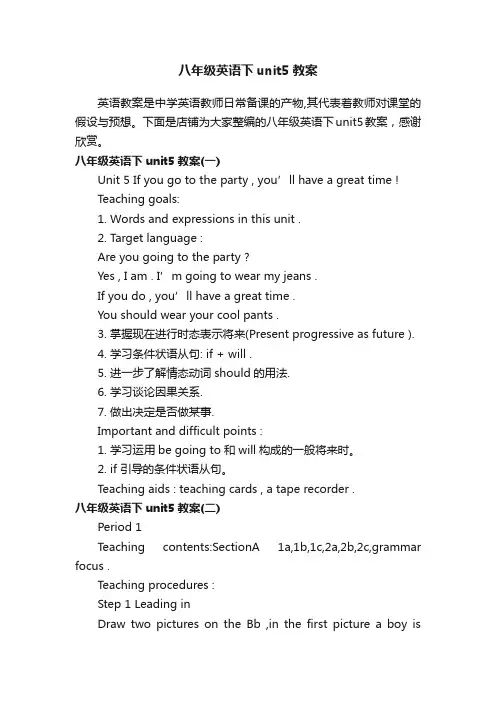
八年级英语下unit5教案英语教案是中学英语教师日常备课的产物,其代表着教师对课堂的假设与预想。
下面是店铺为大家整编的八年级英语下unit5教案,感谢欣赏。
八年级英语下unit5教案(一)Unit 5 If you go to the party , you’ll have a great time !Teaching goals:1. Words and expressions in this unit .2. Target language :Are you going to the party ?Yes , I am . I’m going to wear my jeans .If you do , you’ll have a great time .You should wear your cool pants .3. 掌握现在进行时态表示将来(Present progressive as future ).4. 学习条件状语从句: if + will .5. 进一步了解情态动词should的用法.6. 学习谈论因果关系.7. 做出决定是否做某事.Important and difficult points :1. 学习运用be going to 和will构成的一般将来时。
2. if 引导的条件状语从句。
Teaching aids : teaching cards , a tape recorder .八年级英语下unit5教案(二)Period 1Teaching contents:SectionA 1a,1b,1c,2a,2b,2c,grammar focus .Teaching procedures :Step 1 Leading inDraw two pictures on the Bb ,in the first picture a boy isgetting up late ,and in the second picture the boy can’t catch the early bus .Then talk about the pictures with Ss and write down the sentence “If you get up late , you will not catch the early bus .”Read the sentences ,Ss repeat .Repeat with other sets of pictures .Step 2 Pre-taskSB Page 34 , 1a .1. Point out the pictures and ask Ss to tell what they see .2. Ask some students to read the statements and responses .3. Have Ss match the statements and responses on their own .Step 3 While-taskSB Page 34 , 1b .1. Play the tape and get Ss to check their answers to activity 1a .2. Talk about the answers together .SB Page 34 , 1c .1. Ask two Ss to read the example in the sample in activity 1c.2. In pairs , get Ss to talk about what happened in the pictures .3. Ask some pairs to present their conversations to the class .SB Page 35 , 2a & 2b .1. Read the instructions .Make sure the students know what to do .2. Play the recording .Ss listen and write down their answers .3. Correct the answers .Step 4 Post-taskSB Page 35 , 2c .1. Ask two students to read the sample dialogue .2. In pairs ,get the students to role play the conversation between Andrea and her friend .3. Ask a few pairs of students to practice their conversations for the class .Step 5 Grammar FocusSB Page 35 , Grammar Focus .1. Review the grammar focus .Ask Ss to say the statements and responses .2. Ask Ss to work in small groups .Ask each group to write down as many sentences like those in the grammar focus as they can.3. Ask some groups to share their sentences with the class .Homework :Have Ss write their sentences on their exercise books.教学后记:八年级英语下unit5教案(三)Period 2Teaching contents: SectionA 3a,3b,4,SectionB 1,2a,2b,2c.Teaching procedures:Step 1 Leading inAsk some students to make sentences with if .Step 2 Pre-taskSB Page 36 , 3a .1. First ,let Ss read the notice from the principal .2. Read the dialogue to the class saying bland when come toa blank line .3. Get Ss read the notice again and fill in the blanks .4. Correct the answers .Step 3 While-taskSB Page 36 , 3b .1. Ask some students to read out the sample dialogue and the words in the box .2. In pairs , let Ss have a conversation about the rules .3. Get some pairs to say their conversations to the class .SB Page 36 , Part 4 .1. Read the instructions and ask Ss to complete the work in pairs .2. Ask a few students to share their conversations .Step 4 Post-taskSB Page 37 , Part 1 .Ask students to complete the work on their own .Then do a quick check to see which things are most important to students in the class .SB Page 37 , 2a & 2b .1. Read the instructions and play the recording .2. Ss listen and write down their answers .3. Correct the answers .SB Page 37 , 2c .In pairs , get Ss to role play a conversation according to the information in activity 2b .Homework:Have Ss write their conversations on their exercise books.教学后记:。
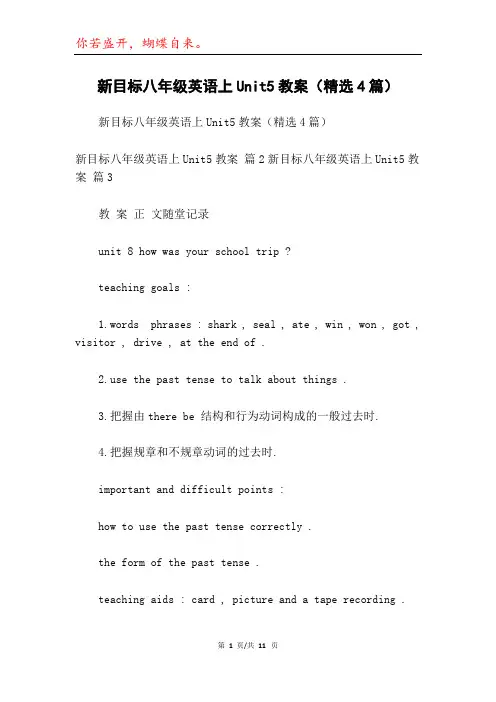
新目标八年级英语上Unit5教案(精选4篇)新目标八年级英语上Unit5教案(精选4篇)新目标八年级英语上Unit5教案篇2新目标八年级英语上Unit5教案篇3教案正文随堂记录unit 8 how was your school trip ?teaching goals :1.words phrases : shark , seal , ate , win , won , got , visitor , drive , at the end of .e the past tense to talk about things .3.把握由there be 结构和行为动词构成的一般过去时.4.把握规章和不规章动词的过去时.important and difficult points :how to use the past tense correctly .the form of the past tense .teaching aids : card , picture and a tape recording .period 1teaching procedures :step 1 leading ingreeting : talk about something the ss did last week .step 2 pre-tasksb page 47 , 1a , 1c .t: what did you do on your last school trip ?look at the picture .guess :what did tina do ?教案正文随堂记录pairwork : did tina buy a souvenir ? no , .step 3 while-tasksb page 47 , 1b .listen and check the answers .sb page 48 , 2a , 2b .play the recording and correct the answers.step 4 post-tasksb page 48 , 2c .pairwork : make conversations .ask several students to present their conversations .step 5 conclusiongrammar focus .review the grammar box .ss say the questions and answers .practice reading .教学后记教案正文随堂记录period 2teaching procedures :step 1 leading ingreeting : talk about what last day off was like .was it a good day off or a terrible day off ?step 2 pre-tasksb page 50 , 1a , 1b .look at the pictures .say something about the pictures .point out the five phrases .ss read after teacher .make sure ss understand what they should do .rank them from 1-5 .pay attention to the conversation in the box on the right .read .pairwork : make conversations .share the students conversations .step 3 while-tasksb page 50 , 2a , 2b .say , now you will hear a conversation about what tina and tony did on their last day off .point out the sample answer in 2a .教案正文随堂记录listen carefully twice .fill in the chart.read the sentences in 2b .pay attention to who said these things .play the tape again .listen carefully .check the answers .sb page 49 , 3a .ask one student to read the article .ss read and work : correct the statements below .listen to the recording .read after it .ask ss to read together .step 4 post-taskpairwork: make conversations with your partner using these phrases : were there ? did you see ? did you go ?step 5 homeworkmake up a story .教学后记教案正文随堂记录period 3teaching procedures:step 1 leading infree talk .check the homework .step 2 pre-tasksb page 51, part 4 .say ,here are some photos of your last vacation .what did you do ?ask and answer with your partner .question like this : did ? what ? were there ?where ? how was ?pairwork .step 3 while-tasksb page51 ,3a .read the letter about the things nick did by ss .explain the new words .play the tape .ss listen and repeat .point to the number 1-5 .point out the sample answer.教案正文随堂记录ss work .then check the answers .play the tape again .practice reading .sb page 51 , 3b .say , imagine you are tony and youll give nick a letter .point out the letter .read the letter to the class .saying blank each time when come to a blank line .read the letter and fill in the blank .ask one student to present the answers .step 4 post-tasksb page 51, 3c .say :we read about the things tony and nick did .what did you do on your last day off .lets write a letter about them .give them help if they need .ss work .step 5 homeworkcomplete the selfcheck .教学后记新目标八年级英语上Unit5教案篇4教案正文随堂记录unit 6 im more outgoing than mysister .period1teaching contents : section a 1a , 1b,1c ,2a ,2b ,2c .teaching goals :1. vocabulary : outgoing , more , than , calm , wild , athletic , twin ,tall , short , thin .2. pattern: he has shorter hair than sam . is tom smarter than tim ?3. 力量目标:能对人物的外表进行描绘,共性进行比较.teaching procedures:step 1leading inask a student to introduce herself/himself .step 2pre-tasksb page 31 , 1a .show some pictures to ss .say ,they are stars .ask ss to tell what they see .ask ss to use the words :tall ,wild , thin , long hair , short hair , heavy , calm , short and so on . 教案正文随堂记录then ask ss to repeat these sentences :yao ming is taller than ronaldo .step 3while-tasksb page 31 , 1c , 1b .call attention to the picture .point out the sample conversation in activity 1c .say ,now work with a partner .make your own conversation about the twins .ask several pairs to say one or more of their conversations .then listen to the recording .ask ss to number the twins .check the answers .sb page 32 ,2a .point out the two columns and read the headings :-er , -ier and more .then point out the words in the box .read .say ,now listen and write the er and ier words in the first column and the words that use more in the second column .play the recording and check the answers .教案正文随堂记录sb page 32 , 2b .point out the picture and the two boxes with the headings tina is and tara is .say ,listen to the recording .write word in the boxes .the words are from the list in activity 2a .play the recording and check the answers .step 4post-tasksb page 32 , 2c .point out the chart in activity 2c and on page 89 . say , make your own conversations according to the information. ask pairs to continue on their own .correct the answers .step 5homeworkhow are you and your sister /brother different ?write down . 教学后记教案正文随堂记录period2teaching contents: grammarfocus , 3a , 3b ,4 .teaching procedures:step 1leading inask ,how are you and your mother/father different ?ask some ss to answer .step 2pre-taskgrammar focus . review the grammarbox .ask ss to read the sentences to the class .call attention to the word "funny',circle "y' and say when a word ends iny ,change "y' to an "i' and add er .write the phrases "more athletic than' .say,when you complete things using words with three or more syllables ,you use the word more .practice : happy , outgoing , short , thin , good .step 3while-tasksb page 33 , 3a .call attention to the letter .ask a student to read it to the class .say, now read the article ,then answer the questions . 教案正文随堂记录write if the statements are true ,or false ,or "dont know' if you dont know the answer .check the answers .sb page 33 , 3b .say ,tell your partner about things that are the same and different between you and a member of your family or a friend .you can make a conversation like the example .ask two ss to read the sample conversation in the box .have ss work and ask some pairs to say their dialogues .step 4post-taskread the instruction to the class .ask pairs of ss how many same and different examples they found .work in pairs and ask some pairs to read their lists .step 5homeworkwrite down the same and different between you and a friend . 教学后记教案正文随堂记录period3teaching contents : section b 1a , 1b , 2a , 2b , 2c .teaching procedures :step 1leading inshow a maxim to ss : a friend indeed is a friend in need .ask ,what kind of things are important in a friend ?step 2pre-tasksb page 34 , 1a .read each description to the class and ask the ss to repeat.what kind of things are important in a friend .rank the things below 1-6 (1 is most important )ask different ss to copy the six phrases on the bb .then read the phrases together .step 3while-tasksb page 34 , 1b .say , now make your own statementsabout friends usingthe phrases in activity 1a .ask some ss to tell the class what they look for in a friend .and say ,who is your best friend ? 教案正文随堂记录sb page 34 , 2a .play the recording and check the answers .sb page 34 , 2b .play the recording and check the answers .step 4post-tasksb page 34 , 2c .say , now work with your partner .make a conversation using information in the chart .ask several pairs to say their conversations to the class .step 5homework连词成句:1. tom , sam , intellectual , more , than , is .2. her sister , as as . not, sports , at , good, is ,liu ying.3. me , same , as , the , friend , my , is .4. makes , laugh , a , me , good , i , think , friend .5. outgoing , are , both , we . 教学后记教案正文随堂记录period4teaching procedures :step 1leadingingreeting .step 2pre-tasksb page 35 , 3b .read the instruction to the class .ask ss to look at the chart on page 34 .ask a student to read the example to the class .say ,now write your own sentences .ask students who finish first to write sentences on the bb.ask some ss to read the sentences ,each student read one sentence one by one .step 3while-tasksb page 35 , 3a .read the instruction .point out the sample answer .say , now read the article .explain the words and sentences in your own words .listen to the recording .教案正文随堂记录say ,now read the article again .underline all the words that describe what people are like .check the answers .sb page 35 ,3c .ask ss to choose a friend to write about .ask ss to try to tell the truth .say ,now finish the activity on your own .ask some ss to read their sentences to the class .step 4post-tasksb page 35 ,part 4 .write the names of two outgoing students on the bb .say ,who do think should get the job , a or b ?ask ss to work in pairs .ask some pairs who they thought should get the job and why .step 5exerciseselfcheck .ask ss to work on their你若盛开,蝴蝶自来。
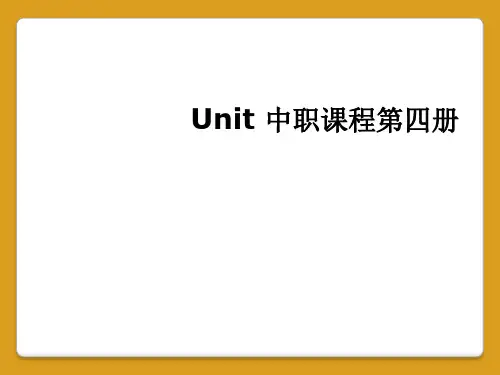
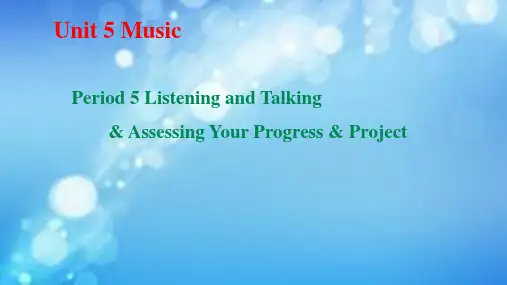
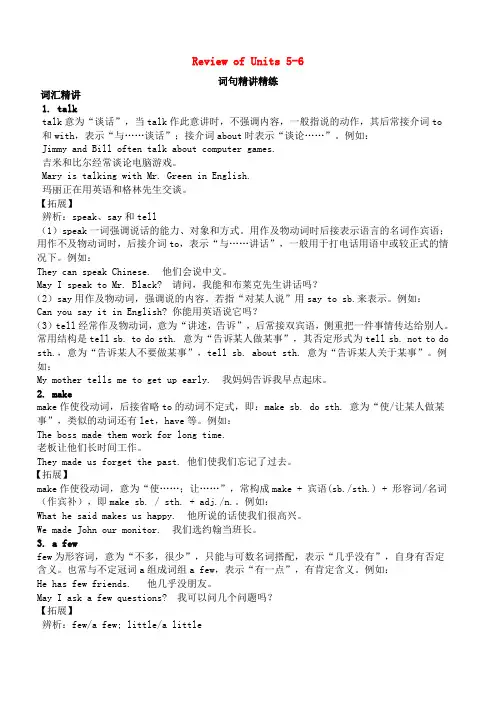
Review of Units 5-6词句精讲精练词汇精讲1. talktalk意为“谈话”,当talk作此意讲时,不强调内容,一般指说的动作,其后常接介词to 和with,表示“与……谈话”;接介词about时表示“谈论……”。
例如:Jimmy and Bill often talk about computer games.吉米和比尔经常谈论电脑游戏。
Mary is talking with Mr. Green in English.玛丽正在用英语和格林先生交谈。
【拓展】辨析:speak、say和tell(1)speak一词强调说话的能力、对象和方式。
用作及物动词时后接表示语言的名词作宾语;用作不及物动词时,后接介词to,表示“与……讲话”,一般用于打电话用语中或较正式的情况下。
例如:They can speak Chinese. 他们会说中文。
May I speak to Mr. Black? 请问,我能和布莱克先生讲话吗?(2)say用作及物动词,强调说的内容。
若指“对某人说”用say to sb.来表示。
例如:Can you say it in English? 你能用英语说它吗?(3)tell经常作及物动词,意为“讲述,告诉”,后常接双宾语,侧重把一件事情传达给别人。
常用结构是tell sb. to do sth. 意为“告诉某人做某事”,其否定形式为tell sb. not to do sth.,意为“告诉某人不要做某事”,tell sb. about sth. 意为“告诉某人关于某事”。
例如:My mother tells me to get up early. 我妈妈告诉我早点起床。
2. makemake作使役动词,后接省略to的动词不定式,即:make sb. do sth. 意为“使/让某人做某事”,类似的动词还有let,have等。
例如:The boss made them work for long time.老板让他们长时间工作。
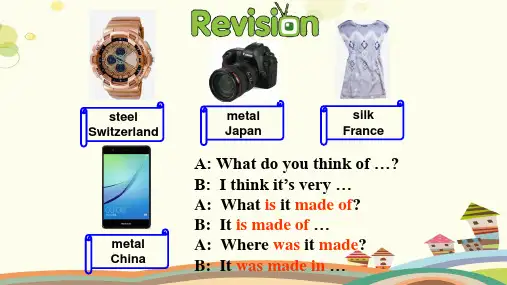
Review of Unit 3-4词句精讲精练词汇精讲1. realize(1)realize作为及物动词,意为“认识到,了解”。
例如:He didn’t realize his mistake until his mother told him.直到妈妈告诉他,他才认识到自己的错误。
I didn’t realize how late it was. 我没有意识到天已经那么晚了。
When he realized what had happened, he was sorry.当他明白发生了什么事时,他感到很难过。
(2)realize还可以表示“实现;完成”的意思。
例如:The girl finally realized her dream of becoming an actress.那个女孩当演员的梦想终于实现了。
【拓展】realize与recognize这两个词都有“认识,识别”的意思,但在具体用法上又有所差别。
(1)recognize也可以用作及物动词,表示“认出, 辨认”的意思。
例如:I recognized his voice. 我辨认出了他的声音。
I recognized her as my friend’s daughter. 我认出了她是我朋友的女儿。
(2)recognize还可以表示“清楚知道;认定”的意思。
例如:I recognized him to be cleverer than I am. 我认识到他比我聪明。
2. invention(1)invention作名词,意为“发明;创造;虚构;发明物”。
例如:Necessity is the mother of invention. 需要是发明之母。
The whole thing is an invention of a newspaper.整件事都是一家报纸虚构的。
The machine is his own invention.这台机器是他自己的发明物。
The Fifth Period The Object ComplementTeaching Aims:1.Revise one of the members of the sentence—the Object Complement to make the students acquire a correct and clear knowledge of it.2.Do plenty of exercises to enable the students to master and use it freely. Teaching Important Point:Revise and master some different kinds of words and phrases as Object Complements.Teaching Difficult Point:How to choose proper words or structures as an object complement,especially between“infinitive”“-ing”form and “-ed”form.Teaching Methods:review,explantion and inductive methods.Teaching Aids:1.the blackboard2.the multimediaTeaching ProceduresStep Ⅰ GreetingsGreet the whole class as usual.Step Ⅱ Grammar StudyT:In the last period we’ve learnt something about the Ojbect Complement.Today we’ll learn more about this grammar item.First,look at the sentences on the screen.Underline the Object Complement and tell what part of speech each of the object complement is.1.The doctor advised Mary to have more exercise.2.How shall we set the whole thing going?3.Please get your blood tested in the next room.4.They made him captain of the ship.5.Why don’t we dye it blue?6.He found everything there in good order.7.He ordered them away.(Teacher tells the class to prepare,then asks some students to give theanswers.)Suggested answers:1.to have more exercise (infinitive)2.going (present participle)3.tested (past participle)4.captain of the ship (noun)5.blue (adjective)6.in good order (preposition phrase)7.away (adverb)T:From these sentences we can see what can be used as object complement.Theyare....(Bb. infinitive;v.-ing/p.p./n./adj./prep-phrase/adv.)T:We often use the infinitive as object complement.The sentence structureis like this....[Bb:Subject+Predicate(vt.)+Object+Infinitive (to do)]Do you know which of the verbs can be used in this sentence structure?S:advise,invite,persuade,encourage,allow,permit,ask,require,expect,wish 1,want,order,force,forbid,warn...(Teacher writes these words on the blackboard.)T:Some verbs can be followed by the infinitive as object complementwithout“to”.The sentence structure is like this....[Bb:Subject+Predicate(vt.)+Object+Infinitive(do sth.)]Can you tell me which of the verbs can be used in this structure?:have,make,let,hear,observe,see,watch,feel,notice,listen to....S2(Teacher writes these words on the blackboard.)T:If we turn the sentence structure into the passive voice,the word“to”can not be omitted.Are you clear about that?Ss:Yes.T:Besides the infinitive,we can also use the present participle and the past participle as object complement.This is the sentence structure...[Bb:Subject+Predicate(vt.)+Object +v.-ing/p.p.]Can the verbs we mentioned just now be used in this sentence structure?:Some of the verbs of sensation,such as S3“hear,observe,see,watch,feel,notice,listen to” can be used in this sentence structure.:The verb“have”can also be used in this sentence structure,too.S4T:You are both right.Now look at the pare the sentences in each group and pay attention to their differences:1.I often hear them sing this song.Suddenly he heard someone knocking gently on the window.He once heard the song sung in German.2.Suddenly he felt the atmosphere grow tense.She felt something crawling up her back.I felt a great weight taken off my mind.3.She was often seen to act like that.Don’t you see a girl running towards us?She was glad to see her children well taken care of in the nursery.4.I won’t have you say such things.I’m sorry to have you waiting so long.You’d better have your shoes mended.5.I have to get him to start at once.He tried to get the engine running.She got a new coat made.T:Look at the first group of sentences.We use the infinitive as object complement to express the whole of an action or event,and we use the present participle to suggest part of an action.:But when shall we use the past participle as object complement?S5T:As we know,the object is the logical subject of the object complement.When we try to express a passive meaning,the past participle should be used.Do you understand?Ss:Yes.T:Look at the fourth group.The first sentence means:cause somebody to do something.The second one means:cause somebody to do something all the time and the third sentence means:have someone else to do something.Is that clear?Ss:Yes.T:In the last group we can see the verb “get”has the same meaning as the verb“have”,but we must say“get sb.to do sth.”.Are you clear about that? Ss:Yes.T:Some of the verbs,such as “believe,consider,feel,find,think,know,etc.”can be followed by“to be+adj./n.”as object complement.Sometimes“to be”can be omitted.Look at the sentence structure on the blackboard....[Bb:Subject+Predicate(vt. believe,consider,feel,find,think,know,suppose)+Object+(to be)+adj./n.]Now look at the sentences on the screen.1.She found him a good pupil.2.I know him to have been a university professor.3.I thought him to be an excellent choice.4.The Chinese diet is considered to be healthiest in the world. (Teacher asks some students to read these sentences and give the Chinese meanings for each sentence.)T:Look at these verbs on the blackboard.(Bb:keep,leave,find,make...) They can also be followed by a compound object.The sentence structure is like this...[Bb:Subject+Predicate(vt.)+Object+v.-ing/p.p./adj./prep.-phrase/adv.]. The verbs “make”and “find”can also be followed by a noun as the object complement.The verb “make”can also be followed by the infinitive without“to”as object complement,but it can’t be followed by the present participle as object complement.Do you understand?Ss:Yes.T:OK.Look at the screen and let’s study the sentences on it.1.It’s dangerous for you to keep the horse running too fast.2.The death of the president made the country sad.3.His English is so poor that he can’t make himself understood.4.If the government left the factory pollu-ting the river,there would be no fish here.5.They found him the right man for the job.6.The weather kept us indoors that day.(Teacher explains the sentences for students and asks some students to give the Chinese meaning.)Step Ⅲ Practice and ConsolidationT:Now you’ve known all the important points about object complement.Next let’s do some exerci ses to have a consolidation so that we can use it freely and correctly.Please look at the screen.Exercise l Fill in the blanks with the proper verb forms:1.I saw him_________ (enter)the room, _________ (take) something and_________ (go)out.2.Please have these boxes_________ (carry)to the station right now.3.They found an old woman_________ (lie) on the ground.4.You’d better get a doctor_________ (pull) out your bad tooth.5.He sat listening to her_________ (climb)the stairs.6.I don’t want that sort of thing_________ (keep) happening.7.He asked for the letter_________ (send) at once.8.The workers were made_________(work) extra hours every day.Suggested answers:1.enter,take,go2.carried3.lying4.to pull5.climbing6.to keep7.to be sent 8.to workExercise 2 Choose the best answers:1.The speaker raised his voice but still couldn’t make himself_________.A.hearB.to hearC.hearingD.heard2.Charles Babbage is generally considered_________the first computer.A.to inventB.inventingC.to have inventedD.having invented3.If you go to Xi’an,you will find the palaces there more magnificent than commonly_________.A.supposingB.supposedC.to supposeD.suppose4.It’s so cold today,we must keep the f ire_________.A.to burnB.burnC.burningD.burnt5.The mother was asked_________let her children_________TV every evening.A.not to;watchB.not to;to watchC.not;watchD.not;watching6.They didn’t observe her_________in and go upstairs.eB.to comeC.cameing7.For a time his grandmother found_________accept his new idea.A.hardB.it hardC.it hard toD.it is hard to8.The patient was warned_________oily food after operation.A.to eat notB.eating notC.not to eatD.not eating9.When I came in,I saw Dr Li_________a patient.A.examineB.examiningC.to examineD.examinedSuggested answers:1.D2.C3.B4.C5.A6.A7.C8.C9.BStep Ⅳ Summary and HomeworkT:In this class,we’ve revised all t he important points about object complement.We’ve summarized some useful sentence structures.(Teacher points to the blackboard and reads the sentence structures to the class.)We’ve also done some exercises.After class,you should learn all the important poi nts by heart and try to use object complement correctly.That’s all for today.Class is over.Step Ⅴ The Design of the Writing onthe BlackboardUnit 5 Getting the messageThe Fifth PeriodObject Complementinfinitive/v.-ing/p.p./n./adj.prep.-phrase/adv.Subject+Predicate(vt.)+Object+Infinitive(to do sth.)advise,invite,persuade,encourage,allow,permit,ask,require,expect,wish,want,order,force,f Subject+Predicate(vt.)+Object+Infinitive(do sth.)have,make,let,hear,observe,see,watch,feel,notice,listen to...Subject+Predicate(vt.)+Object+v.-ing/p.p.hear,observe,see,watch,feel,notice,listen to,have...Subject+Predicate(vt.)+Object(to be)+adj./n.believe,consider,feel,find,think,know,suppose...Subject+Predicate(vt.)+Object+v.-ing/p.p./adj.prep.-phrase/adv.keep,leave,find,make...Step Ⅵ Record after Teaching______________________________________________________________________________________________________________________________________________________________。